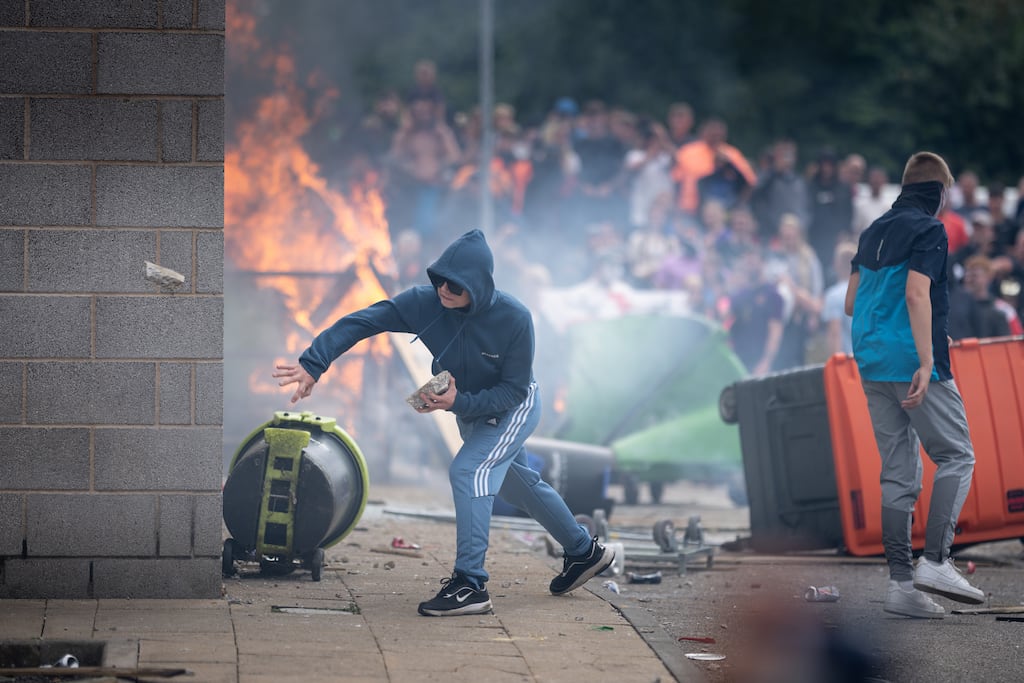The United Kingdom is grappling with a surge in anti-immigration riots, heavily fueled by social media. At the forefront of the controversy is Elon Musk, CEO of Tesla and owner of X (formerly Twitter), who has been actively participating in the online discourse.
Musk’s Controversial Comments
On Sunday, Musk posted on X that “civil war is inevitable” in response to a post blaming the violent demonstrations on “mass migration and open borders.” This remark was swiftly condemned by a spokesperson for UK Prime Minister Keir Starmer, who stated, “there’s no justification for that.”
Undeterred, Musk continued his rhetoric, dubbing Starmer #TwoTierKier, referencing a debunked claim that right-wing protests face harsher policing than those organized by the left. Musk also likened the UK to the Soviet Union for attempting to restrict offensive speech on social media.
Real-World Violence Stoked by Online Misinformation
Musk’s amplification of anti-immigrant rhetoric underscores the significant role false information spread online plays in real-world violence. The UK government has vowed to hold those responsible, including online provocateurs, accountable.
On Tuesday, a 28-year-old man in Leeds was charged with using “threatening words or behavior intending to stir up racial hatred” online. This is part of a broader effort to tackle the online incitement that has led to widespread rioting, which has included damaging public buildings, setting cars on fire, and attacking police officers. The riots were initially sparked by false claims on social media that a Muslim asylum seeker was responsible for a stabbing attack that left three children dead. The actual suspect, Axel Rudakubana, was born in the UK.
The Role of Social Media Platforms
The Institute for Strategic Dialogue (ISD) noted that misinformation about the attack spread rapidly online, with false claims being amplified by platform algorithms. The UK government suspects that bots, possibly linked to state-backed actors, exacerbated the spread of false information.
Challenges in Content Moderation
Despite policies against hate speech and incitement to violence, social media companies struggle with enforcement. Isabelle Frances-Wright from the ISD highlighted that during crises, content moderation systems often fail. This issue is compounded by Musk’s own promotion of incendiary content, undermining efforts to maintain platform integrity.
Government Response
The UK government has pledged to prosecute online criminality and urged social media companies to take stronger action against the spread of misinformation. Home Secretary Yvette Cooper emphasized the urgent need to address the role of social media in inciting violence, calling it a “total disgrace.”
Prime Minister Starmer assured that those involved in the riots, both offline and online, will face swift justice. Meanwhile, Peter Kyle, the minister for science and technology, pressed social media companies to curb the spread of hateful disinformation.
Upcoming Regulations
The UK’s Online Safety Act, set to take effect by the end of the year, will impose new duties on social media platforms to remove illegal content. The act will also criminalize the posting of false information intended to cause harm. Once implemented, Ofcom, the regulatory body, will have the authority to fine companies up to 10% of their global revenue for non-compliance.
Conclusion
As the UK government intensifies its efforts to combat online misinformation and incitement, the role of social media platforms and influential figures like Elon Musk remains critical. The implementation of the Online Safety Act will mark a significant step towards holding these entities accountable and mitigating the real-world impacts of digital disinformation.

